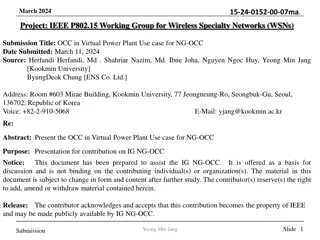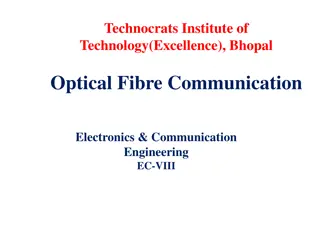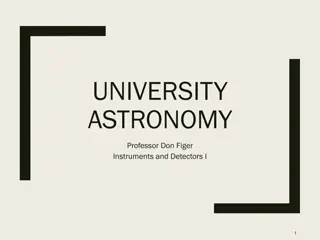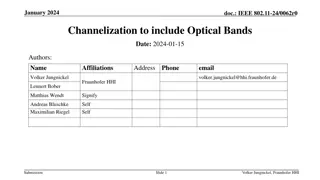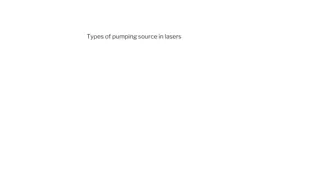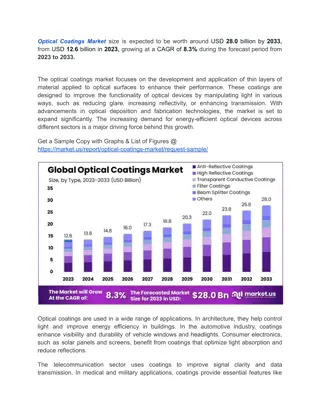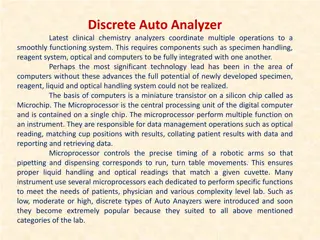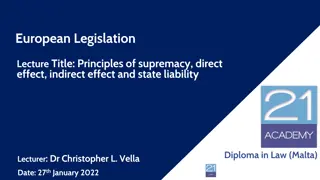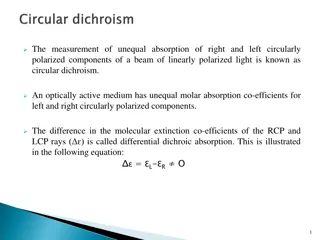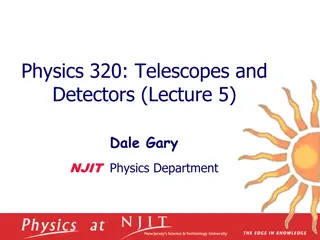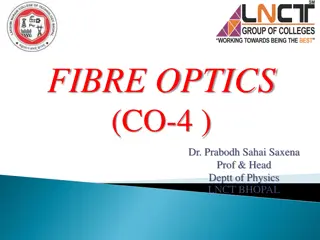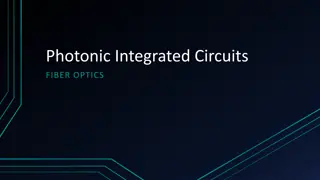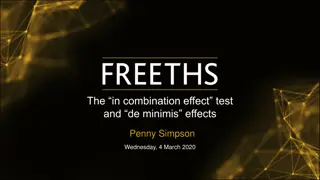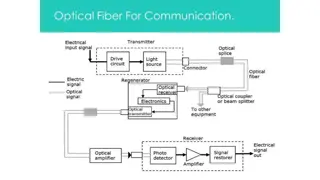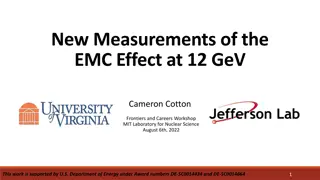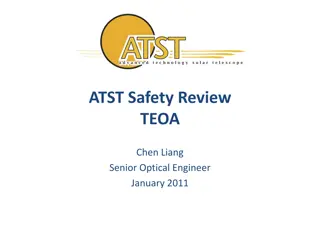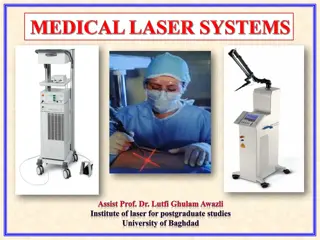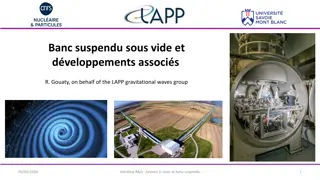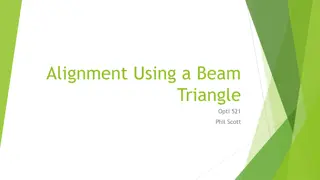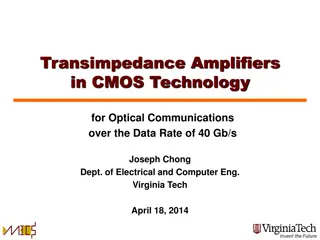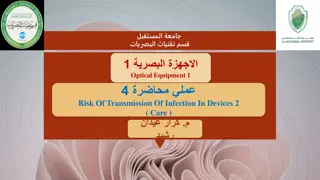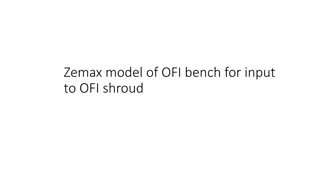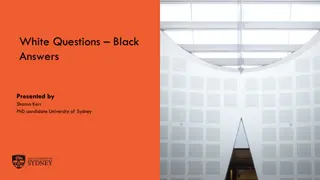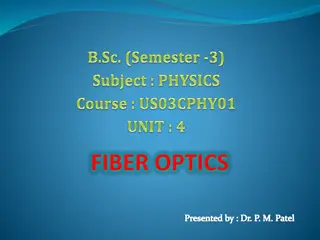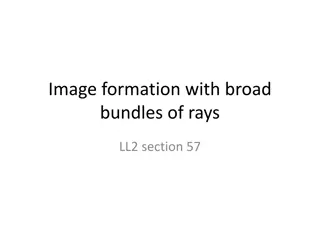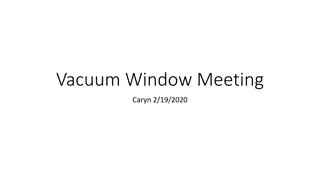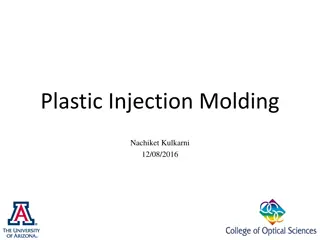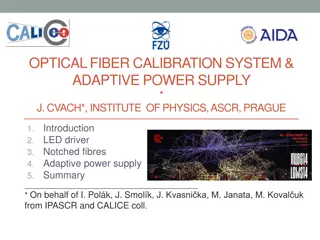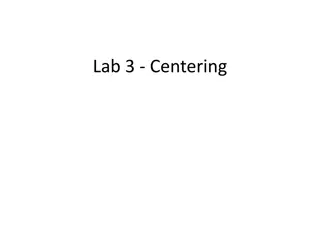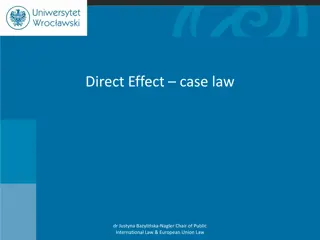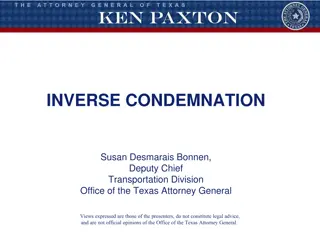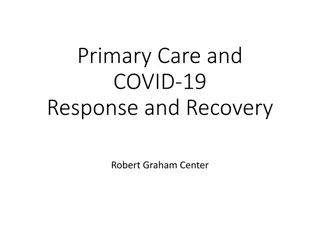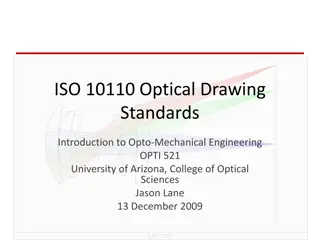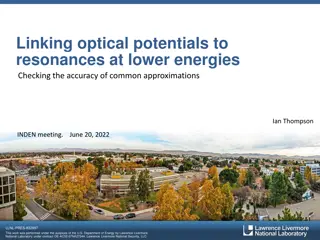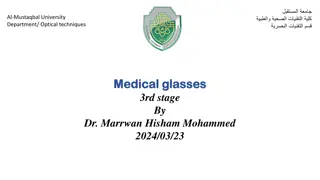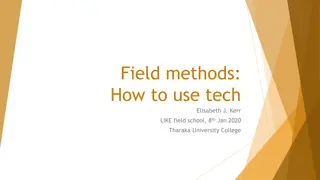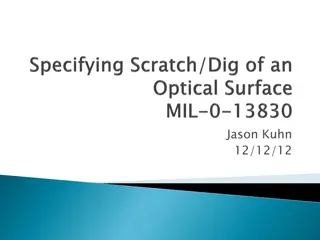Next-Generation Optical Camera Communication in Virtual Power Plants
The submission discusses the application of Next-Generation Optical Camera Communication (NG-OCC) in virtual power plants, highlighting its advantages in transmitting data efficiently and reliably in the energy sector. NG-OCC utilizes light for communication, minimizing interference risks and offeri
5 views • 8 slides
Understanding Optical Fiber Signal Degradation in Communication Engineering
Technocrats Institute of Technology (Excellence) in Bhopal delves into the concepts of signal degradation in optical fiber communication, focusing on attenuation, distortion mechanisms, and measurement techniques. The institute emphasizes the importance of signal attenuation and its impact on inform
4 views • 56 slides
Understanding Modern Optical and Infrared Astronomy Instruments
This presentation by Professor Don Figer explores modern optical and infrared instrumentation used in astronomy, including cameras, spectrographs, and specialized devices like coronagraphs. It covers instruments such as HST, Spitzer, Chandra, JWST, ELTs, and WFIRST, highlighting their capabilities i
0 views • 40 slides
Channelization to Include Optical Bands in IEEE 802.11 Standards
This document discusses the proposal to incorporate optical bands into the channelization framework of the IEEE 802.11 standard. It aims to align the channelization approach for integrated LC with that of mm-wave technology in the IMMW scope. The contribution highlights recent works, emphasizing the
2 views • 11 slides
Types of Pumping Sources in Lasers
Depending on the type of laser, various pumping methods are used including optical pumping, electric discharge pumping, chemical pumping, and heat pumping. Optical pumping utilizes light energy to achieve population inversion in the laser medium, while electric discharge pumping involves passing hig
0 views • 9 slides
Optical Coatings Market: Rapid Growth in Consumer Electronics and Automotive App
Optical Coating Market By Product (Anti-Reflective Coatings, High Reflective Coatings, Transparent Conductive Coatings, Filter Coatings, Beam Splitter Coatings, Others), By Technology (Vacuum Deposition, E-beam Evaporation, Sputtering Process, Ion-As
0 views • 4 slides
Advancements in Discrete Auto Analyzers for Clinical Chemistry Operations
Discrete auto analyzers integrate specimen handling, reagent systems, optical components, and computers for streamlined functionality. The innovation in computer technology, particularly microprocessors, has revolutionized these analyzers, enabling precise data management, liquid handling, and optic
0 views • 17 slides
Principles of Supremacy, Direct Effect, Indirect Effect, and State Liability in European Legislation
This lecture delves into the essential principles of supremacy, direct effect, indirect effect, and state liability within European Legislation, focusing on the foundational aspects and development by the CJEU. It emphasizes the concept of EU law's absolute supremacy over national laws for the achie
2 views • 33 slides
Optical Properties of Optically Active Compounds
Circular dichroism and optical rotatory dispersion are important techniques for studying the optical properties of optically active compounds. Circular dichroism measures the differential absorption of left and right circularly polarized light components, while optical rotatory dispersion studies th
0 views • 17 slides
Understanding Optical Telescope Types and Lens-Maker's Formula
Optical telescopes utilize lenses or mirrors to collect and focus light for imaging celestial objects. The lens-maker's formula is crucial for determining the focal length of lenses, considering factors like index of refraction and radii of curvature. Different lens configurations and materials help
0 views • 17 slides
Overview of Optical Fibre Technology and Applications
Optical fibre technology, spearheaded by Dr. Prabodh Sahai Saxena, revolutionizes communication systems through light transmission. This cutting-edge technology utilizes fibre optics made of glass or plastic to carry light signals, offering advantages like high bandwidth, low signal loss, and no ele
0 views • 20 slides
Evolution of Optical Technology: From Telegraph to Photonic Integrated Circuits
The journey of optical technology evolution spans from the invention of the telegraph in 1836, through the introduction of optical fibers in 1978, to the development of photonic integrated circuits in the present era. Key milestones include the advent of optical amplifiers in 1990, the emergence of
0 views • 70 slides
Understanding the In-Combination Effect Test and De Minimis Effects in Environmental Assessments
This content discusses the complexities of the in-combination effect test and de minimis effects in environmental impact assessments. It covers when the in-combination effect assessment is needed, the legislation surrounding such assessments, and the concept of no appreciable effect as a threshold f
0 views • 21 slides
Fiber Optic Communication System Overview
This article presents a detailed explanation of a point-to-point fiber optic communication system, outlining the process from voice conversion to signal transmission and reception. It discusses the advantages and limitations of optical communication systems, along with numerical examples related to
5 views • 11 slides
New Measurements of the EMC Effect at 12 GeV - Frontiers and Careers Workshop
In this workshop, new measurements of the EMC Effect at 12 GeV were discussed, shedding light on one of the biggest unsolved mysteries in nuclear physics. The discovery, prediction, and quantification of the EMC Effect were explored, raising questions about modifications in nucleon structure within
2 views • 30 slides
Optical Equipment Safety Review and Hazard Analysis
This document provides an in-depth review of the safety considerations for the ATST optical equipment, focusing on potential hazards associated with the M2 Mirror, Heat Stop Assembly, and other critical components. The Preliminary Hazard Analysis identifies various risks, causes, and recommended act
0 views • 13 slides
Overview of Laser Delivery Systems for Surgical Procedures
Institute of Laser for Postgraduate Studies at the University of Baghdad, led by Assist. Prof. Dr. Lutfi Ghulam Awazli, focuses on laser delivery systems in surgical procedures. The systems discussed include optical fibers, articulated arms, hollow waveguides, and free beams. Optical fibers, compose
0 views • 10 slides
Understanding Optical Storage Technology
Optical storage technology originally designed for audio offers a capacity of 650MB, providing over 70 minutes of audio playback. Data is recorded digitally on a polycarbonate disk's surface as microscopic pits. The disk is organized in a spiral track with sectors of the same length arranged in bloc
5 views • 16 slides
Advances in Optical Bench Technology for Gravitational Wave Detectors
This content discusses the latest advancements in optical bench technology for gravitational wave detectors, focusing on precise measurements of back-scattered light, development of new optical cavities, and testing of Sagnac interferometers. Key objectives include improving suspension controls, red
0 views • 13 slides
Optical Alignment Using Beam Triangle Opti 521 Phil Scott
This presentation delves into the intricate process of optical alignment using a beam triangle, focusing on defining optical and mechanical axes, addressing alignment challenges, degrees of freedom for various elements, and the importance of setting up a beam triangle for accurate alignment. The con
0 views • 14 slides
Transimpedance Amplifiers in CMOS Technology for Optical Communications at 40 Gb/s
This research by Joseph Chong at Virginia Tech delves into the use of transimpedance amplifiers (TIAs) in CMOS technology for optical communications operating at a data rate of 40 Gb/s. The study outlines the motivation behind the project, the role of TIAs in optical receivers, TIA circuit topologie
0 views • 52 slides
Understanding Financial Underwriting with Susan Kerr
Explore the world of financial underwriting with Susan Kerr, the Underwriting Director at Manulife. Discover the purpose, basics, and advanced concepts of financial underwriting, including key considerations like income multiples, estate planning, and key person insurance. Gain insights into maintai
0 views • 17 slides
Proper Care and Maintenance of Optical Equipment to Prevent Infections
Regular examination and proper cleaning of tonometer prisms are essential to reduce the risk of transmitting infections during eye examinations. Disinfection and sterilization processes are crucial in maintaining optical equipment hygiene. Different disinfectants and physical methods can be used to
0 views • 24 slides
Optical Frequency Interferometer Bench Analysis
Detailed examination of the optical setup for an Optical Frequency Interferometer (OFI) system, including the input/output configurations with various optical components such as prisms, crystals, and wave plates. The analysis focuses on the path and behavior of beams within the system, considering r
0 views • 14 slides
Understanding Barriers Faced by Indigenous Students with Disabilities
This research project, presented by Sharon Kerr, a PhD candidate at the University of Sydney, delves into the challenges Indigenous students with disabilities encounter in accessing education and support. Through questions and data, the report sheds light on the barriers preventing these students fr
1 views • 26 slides
Evolution of Optical Fiber Technology
Optical fiber technology has a rich history starting from John Tyndall's demonstrations in 1870 to the development of flexible fiberscopes by Hopkins and Kapany. This technology revolutionized communication systems and medical diagnostics, enabling the transmission of information through thin glass
0 views • 85 slides
Optical Image Formation: Principles and Conditions
Understanding the principles and conditions governing optical image formation, including the role of broad bundles of rays, wave surfaces, magnification ratios, and axially-symmetric optical systems. Explore the conditions for imaging line segments, optical path lengths, and the general criteria for
0 views • 13 slides
Optical Testing Setup Procedures for Vacuum Windows and Polarizers
Detailed procedures for optical testing setups involving vacuum windows, polarizers, rotation stages, translation stages, photodiodes, scopes, power meters, and more. The process includes preparing the initial state, rotating analyzers, monitoring transmission, and verifying the direction and magnit
0 views • 5 slides
Understanding Plastic Injection Molding for Optical Components
Plastic injection molding is a cost-effective method for mass-producing optical components, offering an economical alternative to glass. This process involves designing molds, considering factors like shrinkage and surface equations, ensuring smooth mold flow, and regulating fluid flow through gates
0 views • 12 slides
Optical Fiber Calibration System & Adaptive Power Supply by J. Cvach
Introduction to an optical fiber calibration system and adaptive power supply developed by J. Cvach from the Institute of Physics, ASCR, Prague. The system includes an LED driver, notched fibers, and adaptive power supply for various applications, such as the calibration of the CALICE AHCAL and LHCb
0 views • 13 slides
Lab 3: Centering Optical Elements & Systems with Precision
Centering optical elements and systems accurately is crucial for optical alignment processes. This lab focuses on using an air bearing rotary table and dial indicators to achieve precise centering. The equipment used includes PSM, displacement indicators, adjustment screws, and magnetic mounts. Prop
0 views • 14 slides
Understanding Nonlinear Optical Processes in Semiconductors
Exploring the complexities of nonlinear optics in the perturbative and non-perturbative regimes, this research delves into the generation of harmonics, optical Kerr effects, and extreme nonlinear optical phenomena utilizing phase-controlled electromagnetic pulses. The work also investigates the inte
0 views • 15 slides
Direct Effect of Legal Provisions in EU Law: Case Law Overview
Explore the concept of direct effect in European Union law through a comprehensive overview of case law examples, including vertical and horizontal direct effect of treaty provisions, international agreements, regulations, decisions, and directives. Learn about the implications and application of di
0 views • 13 slides
Understanding Inverse Condemnation: Legal Aspects and Case Studies
Explore the concepts of inverse condemnation, Serbonian Bog references, and the legal implications in Texas jurisprudence. Learn about typical and atypical claims, challenges faced by plaintiffs and defendants, and notable cases such as Harris Cty. Flood Control Dist. v. Kerr. Delve into government
0 views • 21 slides
Understanding Primary Care's Response to COVID-19
Explore how the Robert Graham Center and Kerr White are utilizing historic data to project future implications of primary care actions during the COVID-19 pandemic. Discover the shift towards telehealth services and the impact on in-person physician visits in primary care settings.
0 views • 14 slides
Understanding ISO 10110 Optical Drawing Standards
ISO 10110 Optical Drawing Standards provide guidelines for preparing drawings of optical elements and systems, essential for interpreting optical drawings accurately. The standard includes 13 parts covering aspects such as material imperfections, surface form tolerances, and more. Compliance with IS
0 views • 17 slides
Exploring Optical Potentials and Resonances at Lower Energies
Investigating the accuracy of common approximations in linking optical potentials to resonances at lower energies. The study focuses on neutron reactions with 14N as a test case, transitioning from R-matrix theory to Hauser-Feshbach models and evaluating known levels and level densities. Key topics
0 views • 22 slides
Understanding Decentration in Optical Techniques for Medical Glasses
Decentration in optical lenses refers to adjusting the optical center of the lens to align directly in front of the patient's eye. This process is necessary when the frame pupillary distance (PD) or the patient's PD differs. The formula for calculating decentration in single-vision lenses is provide
0 views • 16 slides
Field Methods: Using Technology in Fieldwork by Elisabeth J. Kerr at Tharaka University College
In this collection of images and insights shared by Elisabeth J. Kerr, a linguist from LIKE Field School, the importance of making recordings during fieldwork is emphasized. The advantages of recording sessions include the ability to listen back, ensure transcription accuracy, notice details overloo
0 views • 44 slides
Understanding Surface Scratch Specifications in Optical Elements
This informative content delves into the specifications for surface scratches on optical elements, highlighting criteria such as scratch width, length limitations, and scratch density requirements. It explains how to evaluate compliance with these specifications using examples and images, emphasizin
0 views • 14 slides
